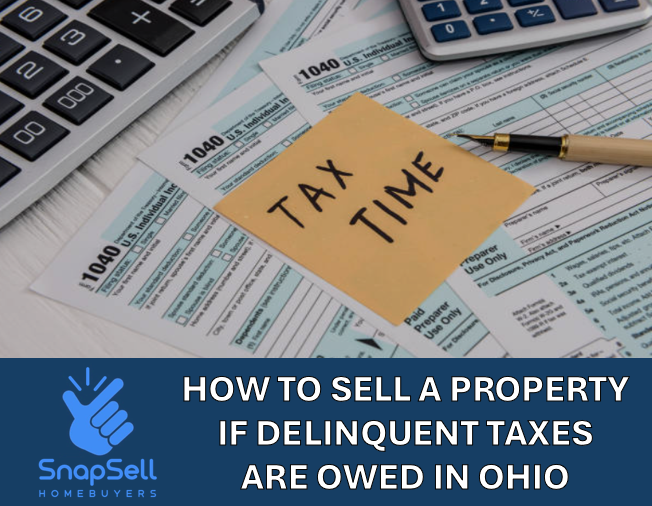
Understanding Delinquent Property Taxes in Ohio
When you own property in Ohio, you must pay a county tax bill each year. If you miss payments, your county records the taxes owed and may add interest and penalties. Over time, unpaid taxes can create a lien on your property.
A tax lien is a legal claim by the government to recover unpaid amounts. In Ohio, delinquent taxes can trigger a tax foreclosure process if not resolved. Counties may also sell tax lien certificates or hold a lien sale to recover unpaid balances. Buyers of lien certificates can collect payment plus interest from the property owner or potentially acquire ownership if the debt remains unpaid.
How Tax Liens Affect the Sale of Your Property
A property lien must usually be cleared before a sale can close. If there are tax liens on your home, the title company will discover them during the closing process. These liens must be satisfied, either from your sale proceeds or by arranging direct payment.
If you are selling in a competitive real estate market, liens may discourage buyers who fear complications. However, many buyers, especially investors familiar with lien properties, are willing to move forward if they know the taxes can be cleared at closing.
It’s important to remember that selling does not erase what you owe. The county or the holder of lien certificates will expect to be paid in full before the deed can transfer.
Options to Sell with Delinquent Taxes Owed
Homeowners facing delinquent taxes in Ohio usually have three main options:
1. Pay Off Taxes Before Listing
The simplest way is to pay your back taxes before you put the property on the market. This ensures a clean title and makes the home more attractive to buyers. You’ll need to contact your county treasurer to confirm the exact balance, which may include penalties and interest.
2. Sell and Use Proceeds to Pay
If you don’t have the funds up front, you can still list your home. At closing, the title company will pay your county tax bill from the proceeds before you receive your share. This is the most common option when selling with delinquent taxes.
3. Negotiate with a Cash Buyer
Some buyers specialize in purchasing homes with liens or in tax foreclosure. They understand how to work with counties, IRS liens, or other debts. While you may sell for less, the benefit is a quick sale without worrying about complicated legal steps.
The Risk of Waiting Too Long
If you delay, your county may move forward with tax foreclosure. Once foreclosure begins, your options narrow. The property may be sold at an auction or transferred through a tax deed sale. At this point, you lose control over the sale price.
Ohio law gives property owners a limited redemption period to pay off what they owe and stop foreclosure. If you can sell before the process reaches an auction, you preserve more of your home’s equity.
Federal and State Tax Implications
When selling, it’s important to understand the tax implications beyond property taxes. If you make a profit, you may owe capital gains or gains tax. In Ohio, profits from selling real estate can affect your income tax filing. At the federal level, the IRS requires you to report the sale and may assess federal tax on gains.
The specific tax rate depends on factors such as how long you owned the home and whether it was your primary residence. Changes in tax reform over the years have adjusted how exemptions and deductions apply. For example, homeowners can often exclude part of their capital gain if they lived in the property for at least two of the last five years.
Selling During or After a Lien Sale
Ohio counties sometimes sell delinquent tax debts through lien investing programs. Investors buy lien certificates at a lien sale and then attempt to collect from property owners. If you sell after this happens, you’ll need to resolve the certificate holder’s claim at closing.
If the lien certificate is not redeemed, the investor may eventually acquire the property through a tax deed. This is why selling quickly is often better than waiting. It allows you to pay off your balance from sale proceeds rather than risk losing the property at an auction.
Working with the IRS or Other Creditors
Sometimes, delinquent property taxes are not your only concern. The IRS may also place a lien for unpaid federal tax or income tax. Like county liens, these must be paid before you can transfer ownership.
Selling with an IRS lien often requires negotiation. In many cases, the IRS will allow a sale if it means recovering what they are owed. You can apply for a lien discharge or subordination, which lets the sale proceed while ensuring the government receives payment from the proceeds.
How Investors Approach Lien Properties
Real estate investors often seek out lien properties because they understand the process and see opportunity in situations where traditional buyers hesitate. These buyers may purchase directly from homeowners in distress, preventing foreclosure and resolving taxes owed.
Investors familiar with lien investing also buy at county auctions or lien sale events. They weigh the risks of tax implications, property condition, and future tax rate changes when deciding on a purchase.
If you are a homeowner, selling to an investor can sometimes be the fastest way to avoid losing your property in a tax foreclosure.
Practical Steps to Sell Property with Delinquent Taxes
If you want to move forward, follow these steps:
- Contact your county treasurer – Confirm the balance of taxes owed and request a payoff statement.
- Check for additional liens – Look for IRS, state, or other creditor liens that must be cleared.
- Decide on a sales strategy – Pay in advance, sell and use proceeds to pay, or work with an investor.
- Disclose taxes owed to buyers – Be transparent. This avoids delays later.
- Work with a title company – They ensure all lien certificates and debts are resolved before closing.
Frequently Asked Questions About Selling Property with Delinquent Taxes in Ohio
Can I sell my house in Ohio if I still owe property taxes?
Yes. You can sell your house even if there are taxes owed, but the liens must be paid at closing. The county or lien holder will collect their balance before the deed transfers to the buyer.
What happens if I ignore delinquent property taxes in Ohio?
If property taxes remain unpaid, the county may begin tax foreclosure. Your home could be sold at an auction or through a tax deed sale, often for less than market value. Acting before foreclosure protects your equity.
What if my property has already been sold at a lien sale?
If your county has sold lien certificates to an investor, you can still sell your property, but you must pay off the certificate holder’s claim at closing. If you wait too long, the investor may take ownership through a tax deed.
What’s the difference between a lien and foreclosure?
A lien is a claim against your property for unpaid debts, while foreclosure is the legal process of taking ownership to recover those debts. Selling before foreclosure begins allows you to settle liens and keep control of the sale.
Can I negotiate with the IRS or county to settle back taxes?
Yes. Both the county and the IRS may allow payment plans or lien subordination to help complete a sale. This ensures they receive payment while allowing you to transfer ownership.
Conclusion: Selling with Confidence Despite Taxes Owed
Selling a property with delinquent taxes in Ohio may feel overwhelming, but it is entirely possible. Whether you settle your county tax bill before listing, pay from sale proceeds, or work with an investor, you have options.
The most important step is to act before the county begins tax foreclosure or schedules an auction. By addressing tax liens early, you protect your equity and avoid losing control over the sale.
If you need to sell your house fast for cash, Snap Sell Homebuyers makes the process simple. We can close on your timeline and handle everything without you making any repairs or paying extra fees. Call us today at (330) 578-7886 to get started. For more info, check out our about us page or read our testimonials to hear from past clients.

